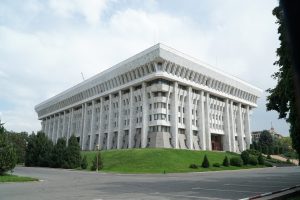The Kyrgyz parliament’s mandate technically lasts until November 2026, but as the body started its fall session this week, there’s been talk of an early dissolution.
In June, Kyrgyz President Sadyr Japarov signed into law amendments to the country’s election law that dropped the mixed system used in the 2021 parliamentary poll.
The Jogorku Kenesh has 90 seats following amendments made in August 2021 that shrunk the body down from 120 seats and laid out a mixed system featuring 36 single-mandate constituencies and 54 seats filled by preferential voting from party lists. Under the new law, there will be 30 electoral districts and three seats filled from each district.
As Bruce Pannier highlighted earlier this year, the new system provides an advantage to independent candidates – their non-refundable electoral deposit is just 100,000 Kyrgyz som (about $1,115), where as parties putting forward candidates will need pay up to 9 million som (about $103,000). This also advantages wealthy individuals while diminishing opportunities for smaller parties, opposition parties, and non-wealthy candidates.
Tynchtyk Shainazarov, since February the head of Kyrgyzstan’s Central Commission for Elections and Referendums (CEC), told Kyrgyz outlet 24.kg that the logic in favor of dissolving the Jogorku Kenesh and holding early elections was clear.
Shainazarov highlighted the political calendar as problematic, highlighting that if an election were held in November 2026, the aftermath could run right into the presidential election slated for late January 2027.
“I would not be against the elections being held this year,” Shainazarov told 24.kg.
In an interview with RFE/RL’s Kyrgyz Service, Radio Azattyk, MP Aida Isatbek kyzy said the question of dissolution would be resolved soon.
In order to dissolve the parliament, two-thirds of the body must approve the initiative. The president can then call for early elections, which have to take place within 60 days.
Kyrgyzstan’s government is marked by persistent instability. Its system has swung between parliamentary and presidential, with political parties never truly taking root beyond the personalities at their center and repeated revolutions triggering a reassessment of what government system would suit Kyrgyzstan best. The transformation in either direction has often been incomplete.
Indeed, the current parliament was elected in a long-delayed vote in November 2021 – more than a year after the botched parliamentary election of October 2020 set off the country’s third revolutionary change of power. That change of power, in which Japarov became president, was followed by a constitutional referendum and myriad changes across the government.
The parliament’s five year term was to conclude in November 2026. While it seems some are antsy for an early election under the newly established rules, other MPs interviewed by Azattyk cast doubts on the necessity.
“I always say: stability is needed everywhere. There must be a reason, a goal for dissolution. I don’t see any reason,” MP Elmurza Satybaldiev said.

































